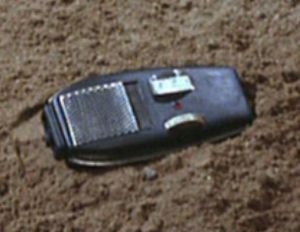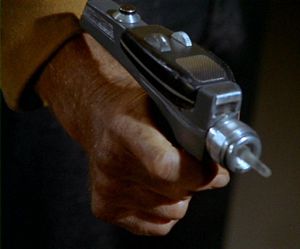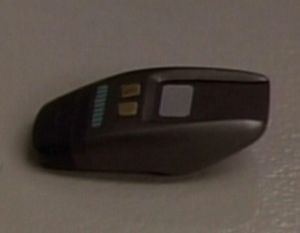Difference between revisions of "Hand phaser"
m (→Limitations) |
|||
| Line 12: | Line 12: | ||
==Limitations== | ==Limitations== | ||
Hand phasers are oddly sensitive to local environmental conditions. Radiation, in particular, seems to negatively affect them. A TOS-era hand phaser once failed after being close to a 20th-century nuclear reactor for a short time<ref>''[[Star Trek IV: The Voyage Home]]''</ref>, and TNG-era hand phasers are known to be non-function in the presence of "hyperonic radiation"<ref>TNG "Ensigns of Command"</ref> | Hand phasers are oddly sensitive to local environmental conditions. Radiation, in particular, seems to negatively affect them. A TOS-era hand phaser once failed after being close to a 20th-century nuclear reactor for a short time<ref>''[[Star Trek IV: The Voyage Home]]''</ref>, and TNG-era hand phasers are known to be non-function in the presence of "hyperonic radiation", whatever that is<ref>TNG "Ensigns of Command"</ref>. | ||
==Gallery== | ==Gallery== | ||
Revision as of 14:29, 4 March 2008
A hand phaser is essentially a phaser pistol. Various models have appeared in Star Trek through the years.
TOS Hand Phasers
In the original Star Trek, the Federation has two types of hand phaser. "Phaser 1" is a small oblong device with an emitter on one end and fire controls on one of its largest surfaces. These controls include a firing button, a dial to change the setting, and a crystal meter, presumably for reading either the setting or the charge status or both. While such a weapon would not be easy to aim at any significant range, it is readily concealable.
"Phaser 2" is actually an add-on for Phaser 1. The device consists of a conventional handle and trigger arrangement (although shamefully lacking a trigger guard) with a larger beam emitter at the end and a niche on top into which a Phaser 1 fits. Presumably the Phaser 1's firing button is disabled when it is attached to a Phaser 2 handgrip, while the meter and adjustment dial function normally for the combined weapon. The Phaser 2 attachment also has a dial at the back which presumably allows the user to adjust the spread of the beam, a feature not seen on Phaser 1. Phaser 2 increases the power output of the weapon, and the combined device probably has greater energy reserves.
TNG Hand Phasers
The TNG-era Phaser 1 is not substantially different from its 23rd-century ancestor. It has a firing button, two buttons for adjusting the setting, and a meter for reading the current setting. It is even smaller and more concealable than the earlier version.
The 24th-century Phaser 2 is not a Phaser 1 attachment like the earlier model. For handling and aiming purposes, this weapon is an ergonomic nightmare. It is, however, something of a Swiss army knife, having sixteen power settings and a variety of beam adjustments that can be used to disrupt force fields[1] or repel "firestorms"[2], among other exotic applications.
Limitations
Hand phasers are oddly sensitive to local environmental conditions. Radiation, in particular, seems to negatively affect them. A TOS-era hand phaser once failed after being close to a 20th-century nuclear reactor for a short time[3], and TNG-era hand phasers are known to be non-function in the presence of "hyperonic radiation", whatever that is[4].
Gallery
| Era | Phaser 1 | Phaser 2 |
|---|---|---|
| 23rd Century | ||
| 24th Century |
Notes
- ↑ TNG "The Arsenal of Freedom"
- ↑ TNG "Lessons"
- ↑ Star Trek IV: The Voyage Home
- ↑ TNG "Ensigns of Command"



